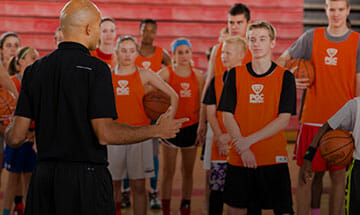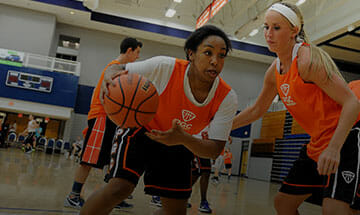Why Zone Defense is Bad for Youth Basketball
It’s 9:15 on Tuesday night. My phone rings, and it’s a youth basketball coach who wants to talk hoops. We have a great discussion about youth development, and toward the end of the call, he asks me how I feel about running a zone in middle school club basketball. I tell him the truth: I think it’s a terrible idea.
Before I go further, let me say a heartfelt thanks to the youth coach who called me and inspired this post. I believe challenging conversations provide a great opportunity for growth—#ironsharpensiron.
That said, I don’t think zone defense should be permitted in youth basketball. What follows are three reasons I’d eliminate zone defense from youth basketball:
Zone defense fails to teach players good defensive habits.
A zone defense should be one player guarding the ball and four players helping guard the ball. However, in youth basketball, zone defense turns into one player jumping out of position and reaching for steals while teammates stand and watch it happen.
Most youth players have yet to develop strong man-to-man defensive skills, and so many youth basketball coaches and teams tend to default to a zone in order to get cheap wins instead of developing long-term, winning basketball habits.
The decision to play zone is even worse in a practice setting. There, players guard weaker second-string players on their own team. This results in poor off-ball positioning, inadequate defensive awareness, diluted on-ball habits, less accountability and little to no communication. Here’s a quick list of poor habits youth basketball zone defenses promote:
- Lazy on-ball defense
- Standing and watching off ball
- Poor closeout technique
- Little accountability
- Lack of communication
- Minimal defensive movement
- Fewer opportunities to guard different positions and areas of the floor
- Fewer opportunities to practice communication in defensive transition
- Fewer opportunities to practice decision-making in defensive transition
- Reduced accountability on box outs
- Fewer decisions while playing help defense
- Decreased defense-rotation repetitions
- Fewer opportunities to learn what constitutes acceptable defensive risk-taking
- Minimal opportunities to defend a screen
- Fewer opportunities for bigger players to guard the ball
Each of the aforementioned reasons NOT to play zone are among the same reasons some coaches choose TO play zone. It’s a classic case of prioritizing winning over development.
Zone defense doesn’t prepare players for long-term success.
At the highest levels of basketball, you see the least zone defense.
Let me say that again—at the highest level of play, with the most skilled players on the floor, there is less zone defense and more man-to-man. Zones work better against less-talented players. Also consider that every zone played at advanced levels of the game is based on sound man-to-man concepts. It is built on a foundation of VERY GOOD individual defenders. Syracuse’s matchup zone works so well because a good coach—Jim Boeheim—TEACHES defensive principles and has VERY LONG, ATHLETIC, DEFENSIVELY GROUNDED players.
Each successful zone is based on active, communicating defenders who understand the positioning, movement, vision, decision-making and on-ball habits developed from years of learning to guard their man. Well-played zones are based on man principles. Man principles, taught first, create good zone defense. Every good coach will tell you that the toughest zone to play against is a well-taught matchup zone with players who have sound defensive habits like those listed above.
Zone defense robs opponents of the opportunity for offensive development.
I doubt many coaches have considered this. Choosing to play zone at the youth level is incredibly selfish and shortsighted. Be good to the game.
When a coach chooses to play zone against another youth basketball team, who, again, can’t shoot well from 3-point range, has few experienced players and lacks the physical strength to make the long, hard passes needed to punish a zone, they rob that team of an opportunity to develop offensively.
A zone leads to the offensive team standing around and watching the one or two good offensive players over-dribble and attempt tough shots against multiple defenders. This creates bad habits for the offensive players and means the weaker players touch the ball less, get fewer opportunities to make an impact on the game, and lose the joy of playing as they fail to make shots they are forced to take that are well outside their effective range.
I love the game, and I want every person who chooses to pursue basketball to enjoy the richness of the game. I want to protect the players, protect the coaches and protect the game. Of course, there will be a fair number of coaches who will read this and immediately begin justifying why their zone is actually good for their players. To those coaches, I’d say: We can do better. Protect the game. DON’T PLAY ZONE.
Related Articles
5 Ways Any Basketball Player Can Earn More Playing Time
Want more playing time? Stop asking for it and start earning it. These five habits separate players coaches trust from players who stay stuck on the bench.
5 Ways to Practice Mental Toughness
Here are five ways to practice your mental toughness off the court. If you practice these five things, every day, you’ll develop greater self-discipline. You’ll become unstoppable in anything you do. It is five things you will have to rise above your feelings every day. That is how you build mental toughness. You develop, as a habit, a muscle of rising above your feelings to level of your aspirations and commitments.
Why Is My Performance Inconsistent?
Do you ever feel like your performance in games is consistently inconsistent? That you’re putting in the same hard work at practice every day, yet some days you play really well and others you don’t play well at all? If that’s you, you’re not alone. If that’s not you, don’t worry—the frustration is coming soon!
About PGC
PGC Basketball provides intense, no-nonsense basketball training for players and coaches. Our basketball camps are designed to teach players of all positions to play smart basketball, be coaches on the court, and be leaders in practices, games and in everyday life.
We combine our unique PGC culture with a variety of teaching methods and learning environments to maximize the learning potential of those that attend our sessions. In addition to spending 6-7 hours on the court each day, lessons will be reinforced through classroom sessions and video analysis.
Our goal at PGC is to empower you with the tools to fulfill your basketball dreams, while also assisting you in experiencing the joy of the journey.
To learn more about PGC Basketball, including additional basketball training tips and videos, visit our YouTube Channel or find us on Facebook, Instagram, and Twitter.














Share This Post